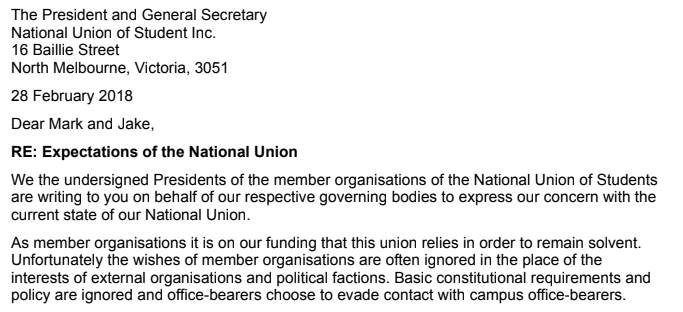Coalitioning with seven other university student associations, ANUSA is hoping to send an ultimatum to the NUS: if the organisation fails to clean up their act, the universities will not accredit with the national student union.
It’s the second consecutive year that ANUSA is threatening not to affiliate with the organisation unless they meet certain requirements. Last year, ANUSA did not accredit after the NUS contravened one of the requirements, choosing a factionally-aligned returning officer.
The other university student unions that have been named in the letter are Curtin Student Guild, UWA Student Guild, ECU Student Guild, University of Melbourne Student Union, University of Sydney SRC, University of Newcastle Student Association and Flinders University Student Association. Currently, the policy has not been signed by any of the eight universities.
Together, these student bodies represent 40 per cent of the NUS’ annual accreditation fees. The universities hope that, by holding $240,000 worth of accreditation fees over the organisation’s head, they can manufacture some structural changes. The NUS’ annual budget is near $1 million.
ANUSA’s proposed affiliation fees are $10,000.
The letter asks that the NUS uphold key performance indicators — of which some were used last year by ANUSA when they similarly requested the NUS clean up their act.
One of the letter’s demands is that the NUS appoints a returning officer this year that is not a member of any NUS faction.
The letter also demands that the NUS conduct an independent annual audit of their finances. In 2013, a report from independent auditors TLConsult stated that structural problems “unchanged for nearly two decades” meant that the NUS only had enough funds to “sustain the organisation for approximately one year in its current form”.
The letter further requires that the organisation upload all recent minutes and reports onto their website.
The ANUSA student representative council, a body of ANUSA executives, elected general representatives, college representatives and department officers, will vote on the accreditation policy in a meeting on Tuesday.
However, some within the SRC will oppose the motion. General representative Ashish Nagesh, who has opposed accrediting with the NUS in the past, supports putting the question to a student body referendum. The last time ANUSA held a university-wide referendum on the topic was in 1992 — it caused one of the largest turnouts to a student vote in ANU’s history, with other 2500 ballots cast. Over 1500 of those votes opposed affiliation.
Nagesh told Woroni that he also had concerns about the transparency of the NUS debate.
“It has definitely not been fair, many members of the SRC have expressed frustration that they were not involved,” said Nagesh, speaking of the involvement that SRC members have had with setting the affiliation requirements. “On Tuesday I will fight for change. ANUSA is an organisation that should be accountable and transparent and it currently isn’t within its own SRC.”
NUS president Mark Pace told Woroni that if an ultimatum became university policy, he would try his hardest to meet the requirements set out by the eight tertiary institutions.
“It’s important that member organisations to the NUS feel like their students are being effectively and responsibly represented,” Pace said. “The national office bearing team will be working hard throughout the year to respond to the indicators set by ANU students.”
When asked specifically about the requirement that the returning officer not be factionally-aligned, Pace said he would advocate for a change.
“While the decision will be decided by the 17 voting members of the national executive, I’ll be recommending a non-factional returning officer.”
The NUS came into being in 1987, and aims to be a national student voice on government policy and student affairs.
Editor’s Note (21/3/18): An earlier version of this article stated that the seven other universities had hoped to sign onto the letter. This article has been changed to reflect the fact that the seven other student unions named in the letter may not want to sign the ultimatum. References to NUS ‘affiliation’ were also replaced by language of ‘accreditation’ as part of this amendment.
We acknowledge the Ngunnawal and Ngambri people, who are the Traditional Custodians of the land on which Woroni, Woroni Radio and Woroni TV are created, edited, published, printed and distributed. We pay our respects to Elders past and present. We acknowledge that the name Woroni was taken from the Wadi Wadi Nation without permission, and we are striving to do better for future reconciliation.
